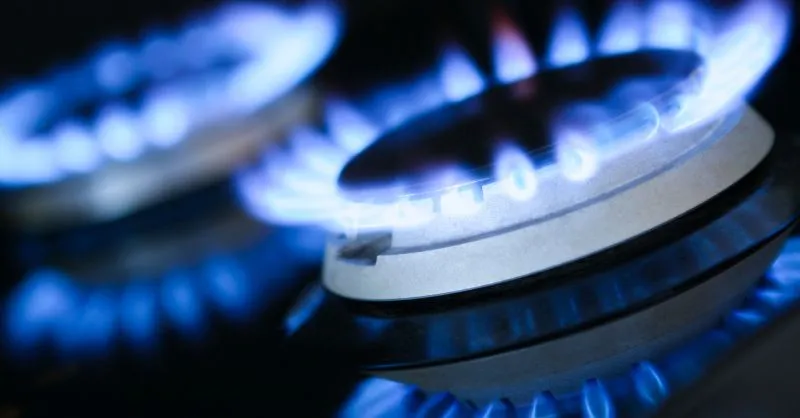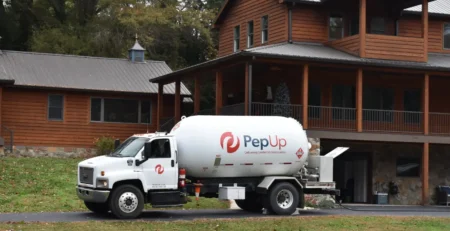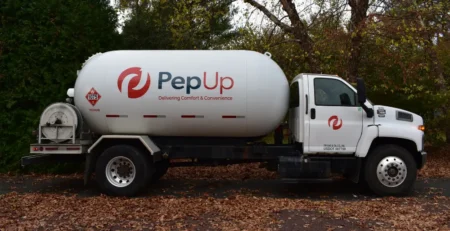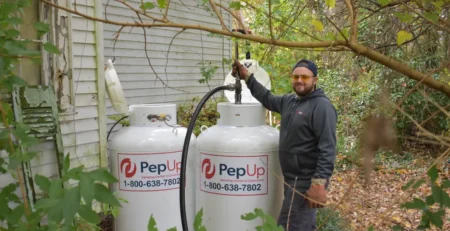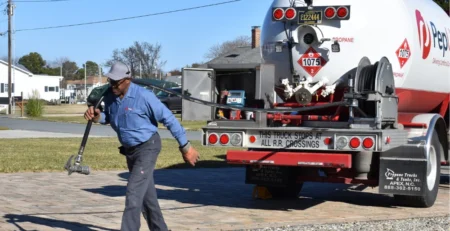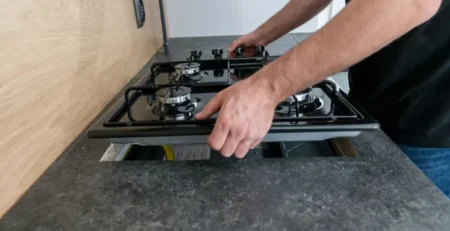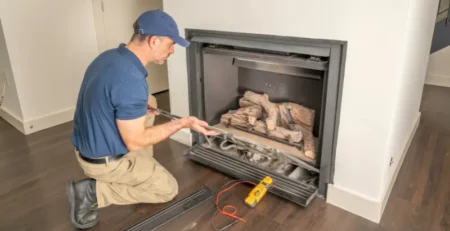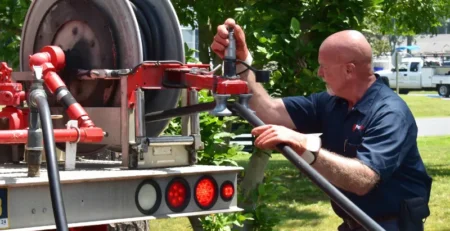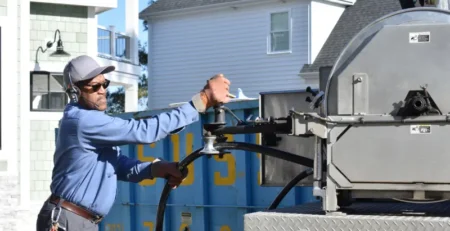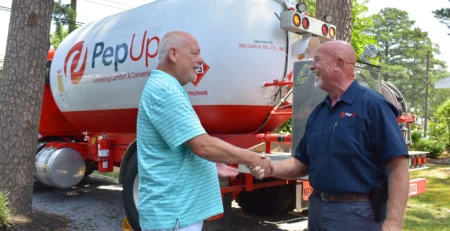Propane gas vs. natural gas: Which is better for your home?
Some local residents have wondered about propane gas vs. natural gas for home energy needs, so we decided to break down the differences for those who are considering switching to propane.
Whether you already have natural gas service at your home or you’re building a new home and thinking of adding propane, we’ve put together some pros and cons of propane gas vs. natural gas so you have all the information you need to make an informed decision.
Jump ahead to:
- Propane vs. Natural Gas Comparison Chart
- Understanding the Fuels: Composition, Energy Output, and Cost
- Converting natural gas appliances to propane gas
- Benefits and drawbacks of using natural gas vs. propane gas for your home
- Mid-Atlantic & Delmarva Regional Resources
- Frequently Asked Questions (FAQs) About Using Propane vs. Natural Gas
Propane vs. Natural Gas Comparison Chart
An easy-reference comparison guide for Delmarva Peninsula homeowners
| Feature | Propane | Natural Gas |
|---|---|---|
| Availability |
|
|
| Installation Costs |
|
|
| Fuel Costs |
|
|
| Storage |
|
|
| Delivery & Monitoring |
|
|
| Appliance Efficiency |
|
|
| Appliance Conversion | Many natural gas appliances can be converted to propane with professional installation | Propane appliances can be converted to natural gas |
| Best For |
|
|
*Heat energy is measured in British Thermal Units, which helps compare heating efficiency by determining how many “units” it takes to raise the temperature of a pound of water by one degree, Fahrenheit.
Note: Both propane and natural gas require carbon monoxide detectors in homes for safety. All installations and appliance conversions should be performed by licensed professionals.
Before you decide, consider installation costs
If you’re like many residents in the more densely populated areas on Delmarva, you may already have natural gas lines supplying fuel to your home. Or, if you live in a more rural area, you may not have the convenience of nearby gas lines to tap into.
Piping natural gas to a home can be expensive, if it’s even an option. That’s why propane is the fuel of choice for many of our customers. It’s easy and cost-effective to plumb and install when compared to natural gas, and each homeowner controls their own fuel supply via onsite storage in pressurized and right-sized propane tanks leased from (and maintained by) PepUp.
Understanding the Fuels: Composition, Energy Output, and Cost
Natural Gas
Natural gas is predominantly composed of methane and is sourced from underground natural reserves via drilling and fracking. It emerges alongside petroleum deposits and is processed to remove impurities.
Natural gas is generally cheaper to purchase, per BTU, in areas where pipeline infrastructure already exists to lower transportation costs. Natural gas is generally more convenient in urban areas.
Propane
Propane, a byproduct of natural gas processing and petroleum refining, consists of hydrocarbons like propane and butane. It is extracted from raw natural gas using refrigeration and pressure.
Propane has a higher energy content per unit, meaning appliances using propane are often more efficient, more than making up for its higher cost per BTU. Propane is ideal for rural homes or those without nearby gas transmission lines.
Which is better?
Propane has a higher energy content per unit than natural gas, of approximately 2,500 BTUs per cubic foot compared to natural gas’s 1,030 BTUs per cubic foot. This means propane-powered appliances tend to be more efficient, offering more heat and energy per unit of fuel consumed.
This greater energy potential per unit also results in more efficient heating when propane is used for a home’s primary heating source.
Converting natural gas appliances to propane gas
Switching to propane from natural gas offers many benefits, including the fact that many natural gas appliances can be converted to run on propane.
Conversion requires professional installation of specialized components designed to manage the pressure and energy differences between the two fuels. The components are usually available directly from your appliance manufacturer, and PepUp technicians can install them correctly for safe operation.
Wondering which appliances work best when they run on propane? Check out our top five choices for liquid propane gas (LPG) appliance swaps.
Benefits and drawbacks of using natural gas vs. propane gas for your home
A homeowner should consider a cost-benefit analysis of choosing natural gas vs. propane gas for their home’s primary fuel source, with a hefty consideration for the cost of installation if their home doesn’t already have natural gas supply lines connected. Here are a few pros and cons of each fuel type.
Propane vs. Natural Gas: Benefits & Drawbacks
| Propane | Natural Gas |
|---|---|
| BENEFITS | |
|
High Efficiency:
Flexible Location:
Reliable Onsite Storage:
Safety:
|
Continuous Supply:
Lower Fuel Costs:
Minimal Storage Hassles:
|
| DRAWBACKS | |
|
Higher Fuel Costs:
Regular Deliveries:
Initial Setup:
|
High Installation Costs:
Limited Availability:
Environmental Concerns:
|
Propane: The clean-burning choice to reduce environmental impact
Both natural gas and propane burn cleaner than other fossil fuels, but propane produces fewer pollutants during combustion. This produces far less impact on air quality. Natural gas can release methane during extraction and transport, which, although not directly harmful to air quality, contributes significantly to global warming.
Mid-Atlantic & Delmarva Regional Resources
- Maryland Energy Administration: energy.maryland.gov – State energy programs and incentives
- Delaware Division of Energy & Climate: energize.delaware.gov – Energy efficiency resources and rebates
- Maryland Public Service Commission: psc.state.md.us – Utility regulations and consumer information
- Delaware Public Service Commission: depsc.delaware.gov – Utility oversight and consumer protection
- Propane Education & Research Council: propane.com – National propane safety and efficiency information
- Maryland Department of the Environment: mde.maryland.gov – Environmental regulations and air quality
- Delaware Department of Natural Resources and Environmental Control: dnrec.delaware.gov – Environmental standards and energy programs
Need more information? We can help.
PepUp Energy Specialists have a lot of the answers you’re looking for. We help hundreds of local Delmarva residents make informed decisions about propane every day, so if we don’t have the answer, we’ll find it for you.
Our local network includes regional office locations throughout our service area, so you can always find the answers you need and meet up with one of our specialists in person to talk through any concerns you may have about choosing a dependable, local energy provider.
Frequently Asked Questions (FAQs) About Using Propane vs. Natural Gas
Natural gas typically costs less per BTU ($6-$15 per thousand cubic feet), but propane’s higher efficiency (2,500 BTUs per cubic foot vs. natural gas’s 1,030 BTUs) means you need less fuel to achieve the same heating results.
The true cost depends on your location, current market prices, and appliance efficiency. In rural Delmarva areas without natural gas infrastructure, the high installation costs of extending gas lines (often $10,000+) make propane the more economical choice despite higher per-unit fuel costs.
Yes, most natural gas appliances can be converted to propane with a manufacturer’s conversion kit and professional installation.
The conversion requires specialized components (different orifices and pressure regulators) to manage propane’s higher pressure and energy density. Conversion kits are typically available directly from your appliance manufacturer, and PepUp technicians can install them correctly for safe operation. Never attempt DIY conversion; professional installation is essential for safety, and also includes a pressure test once your propane is connected to the appliance.
Natural gas availability is limited in rural parts of the Delmarva Peninsula. More densely populated areas like Dover, Salisbury, and parts of New Castle County may have natural gas infrastructure. Rural communities throughout Caroline, Dorchester, Somerset, Accomack, Kent, and Queen Anne’s counties, however, may not have access to natural gas pipelines.
Propane is the ideal fuel choice for these areas since it doesn’t require pipeline infrastructure and can be delivered anywhere by truck.
Propane is more efficient for home heating. With 2,500 BTUs per cubic foot compared to natural gas’s 1,030 BTUs, propane provides more than twice the energy per unit.
Propane furnaces often achieve 90-95% efficiency ratings, while natural gas furnaces range from 78-95%. This higher energy density means propane appliances heat faster, maintain temperature better, and use less fuel to achieve the same results. For primary heating in Delmarva’s cold winters, propane’s superior heating capacity makes it the preferred choice.

Meet Contributor and PepUp Home Propane Delivery Driver, Jeff North
Customers in our West District – Federalsburg area may recognize this smiling PepUp face. Jeff North has been delivering home propane with a smile since 2021. Jeff says the best part of his job is getting friendly waves on the road and catching up with long-time customers.

